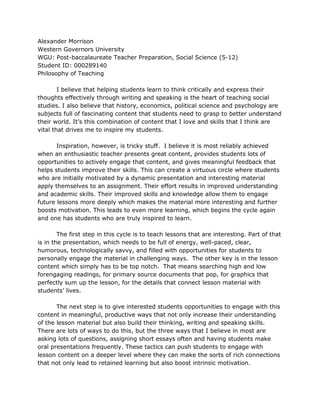
Morrison teaching philosophies
- 1. Alexander Morrison Western Governors University WGU: Post-baccalaureate Teacher Preparation, Social Science (5-12) Student ID: 000289140 Philosophy of Teaching I believe that helping students learn to think critically and express their thoughts effectively through writing and speaking is the heart of teaching social studies. I also believe that history, economics, political science and psychology are subjects full of fascinating content that students need to grasp to better understand their world. It’s this combination of content that I love and skills that I think are vital that drives me to inspire my students. Inspiration, however, is tricky stuff. I believe it is most reliably achieved when an enthusiastic teacher presents great content, provides students lots of opportunities to actively engage that content, and gives meaningful feedback that helps students improve their skills. This can create a virtuous circle where students who are initially motivated by a dynamic presentation and interesting material apply themselves to an assignment. Their effort results in improved understanding and academic skills. Their improved skills and knowledge allow them to engage future lessons more deeply which makes the material more interesting and further boosts motivation. This leads to even more learning, which begins the cycle again and one has students who are truly inspired to learn. The first step in this cycle is to teach lessons that are interesting. Part of that is in the presentation, which needs to be full of energy, well-paced, clear, humorous, technologically savvy, and filled with opportunities for students to personally engage the material in challenging ways. The other key is in the lesson content which simply has to be top notch. That means searching high and low forengaging readings, for primary source documents that pop, for graphics that perfectly sum up the lesson, for the details that connect lesson material with students’ lives. The next step is to give interested students opportunities to engage with this content in meaningful, productive ways that not only increase their understanding of the lesson material but also build their thinking, writing and speaking skills. There are lots of ways to do this, but the three ways that I believe in most are asking lots of questions, assigning short essays often and having students make oral presentations frequently. These tactics can push students to engage with lesson content on a deeper level where they can make the sorts of rich connections that not only lead to retained learning but also boost intrinsic motivation.
- 2. The final step in the cycle is to give students meaningful feedback.Writing is hard, speaking is hard, thinking is hard, and when one asks students to do these things, it is vital tovalue what they produce. Teachers show they value student work through the quality of their feedback. Really good feedback goes beyond simply recognizing where students have been most successful and providing constructive criticism for where they can improve – though these are important aspects of good feedback. Feedback should also push students in their thinking,challenge even well thought out arguments, encourage the consideration of other points of view or modes of thinking. This kind of feedback builds students’ skills and knowledge and also increases their desire to learn by honestly engaging their ideas and by showing them an attainable path to academic success. My teaching philosophy also dictates my preparation for the classroom because it requires me to know both my subjectmaterial and my students. By leveraging this blend of knowledge, I willcraft lessons my students can connect with and give them feedback they can value. The first challenge, to master the lesson content, is impossible to complete but important to attempt. There is just too much content out there to experience and know it all. Trying to digest as much of it as possible is not so much a scholarly pursuit as it is a storyteller’s. I will bring my lessons alive by sharing with my students themost accessible, engaging and valuable content I can find. The second task, to know my students, though equally challenging and fascinating, is even more rewarding. While it’s vital to assess my students’ academic strengths and weaknesses, it’s equally important to understand them as individuals. If I understand the experiences that have shaped my students’ lives, the way they think about the world, and what they want to become, I will be able to find ways to connect them to the subject matter. That’s why it’s vital to have both academic and personal conversations with my students. So, I hope to combine this blend of student and subject matter knowledge with energetic teaching to inspiremy students to learn. I believe students who learn – who understand their world, who think about it critically, and who express their thoughts effectively – are not only likely to continue to learn, but also likely to act bravely, intelligently and responsibly.